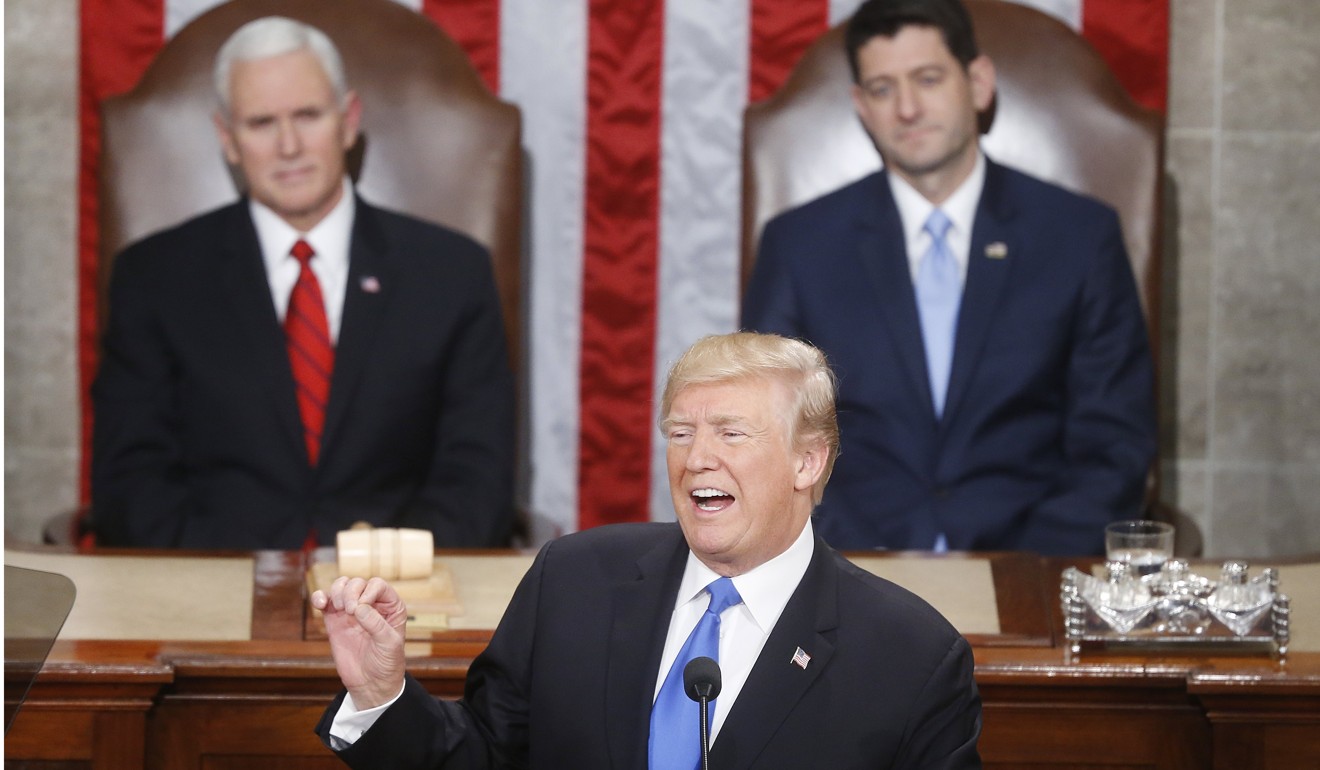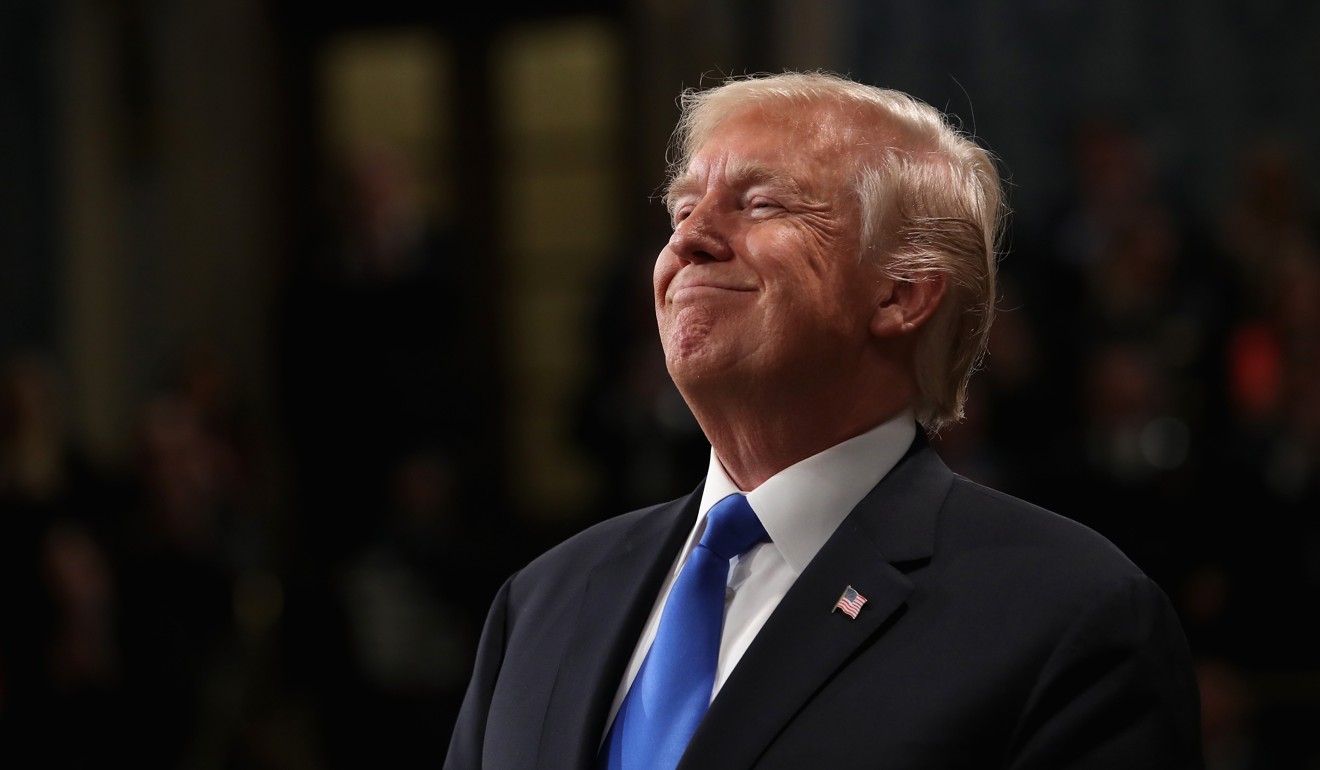
Trump has declared a trade war against the whole world
US president’s protectionist state-of-the-union address ignores a great lesson from history – free trade underpins peace among nations, writes Richard Heydarian
“The era of economic surrender is over,” declared US President Donald Trump in his first state-of-the-union address in Washington. “From now on, we expect trading relationships to be fair and to be reciprocal,” he warned.
Trump underscored his administration’s commitment to “fix bad trade deals” and to start to negotiate new ones, which will “protect American workers and American intellectual property, through strong enforcement of our trade rules”.
In few sentences, the tough-talking American leader effectively declared a trade war against the world, particularly export-oriented nations in Asia. This is nothing short of a misguided, self-defeating measure, which will only accelerate America’s structural decline as the world’s waning superpower.
A week earlier, Washington imposed unprecedented sanctions on imports of solar panels and washing machines, disproportionately hitting leading producers such as China, South Korea, Mexico and Thailand.
Over the coming months, the Trump administration is expected to impose new sanctions, targeting the heavy as well as hi-tech industries of rival economies, with a particular focus on China.
In response, both allies and rivals have warned Trump against initiating a misguided trade war, which would unleash a dangerous beggar-thy-neighbour dynamic among the world’s biggest economies.
South Korean Trade Minister Kim Hyun-chong condemned America’s latest tariffs as “excessive and a clear violation” of World Trade Organisation rules. South Korean companies such as Samsung and LG are among leading producers of washing machines.

In many ways, the new trade measures add insult to injury as Washington has either cancelled new trading agreements with Brussels or is in the process of renegotiating existing ones with Seoul and Mexico City.
Naturally, America’s partners are livid.
Almost overnight, Trump has poisoned historically warm relations with its strategic allies in Europe, Asia and Latin America, who are expected to take America to international courts for imposing unilateral trade sanctions.
This will only compound Washington’s collapsing influence across the globe under Trump’s watch. The starkest and most potent warning, however, came from China, which expressed “strong dissatisfaction” with America’s brazen display of protectionism, which only “aggravates the [fragile] global trade environment”.
Beijing beckoned Washington to exercise restraint in using trade restrictions, warning that it would not hesitate to resolutely defend its legitimate interests if and when a full-scale trade war ensues.
China has multiple trump cards against the US. Back in 2009, when the Obama administration decided to impose a 35 per cent tariff on Chinese tyres, Beijing retaliated by restricting imports of American cars and food.
This time, China can extend the horizons of retaliation by permanently shutting out American tech companies, raising taxes and reducing benefits for US investors, reducing imports of American food and cancelling large-scale purchases of Boeing and Apple products.
The reality, however, is that America and China are locked in a mutually assured financial destruction, thus any large-scale trade war would ultimately disrupt the world’s two biggest economies.
The corresponding impact on the global economy would be catastrophic since the American financial sector and the China-centred supply chains are central to the functioning of the global economic system.
Almost a century ago, the United States precipitated a global economic depression by enacting the highly protectionist Smoot-Hawley Tariff Act, under which it imposed tariffs on more than 20,000 imported goods.

The US president, however, seems to completely miss this crucial point by dangerously treating trade among sovereign states like aggressive mergers among profit oriented corporations.
Worryingly, the Trump administration is contemplating various unilateral trade-related mechanisms, which could lead to more draconian protectionist measures.
Under Sections 232 and 301 of the US Trade Act, for instance, Washington is considering imposing sanctions against Chinese steel and aluminium imports for alleged unfair trade practices as well as hi-tech industries for alleged intellectual property rights theft.
The Trump administration is also considering a special investigation into supposed anti-dumping practices (state-subsidised mass production by local companies) in China.
The US president has warned of a “very big intellectual property potential fine”, which “is going to come out soon”.
In a surreal twist of events, America has abandoned its role as the anchor of the global economic order in favour of aggressive trade protectionism. What is at stake is not only America’s influence, which is in free fall, but the hard-earned peace that came on the ashes of two world wars.
Richard Heydarian is a Manila-based academic and author

